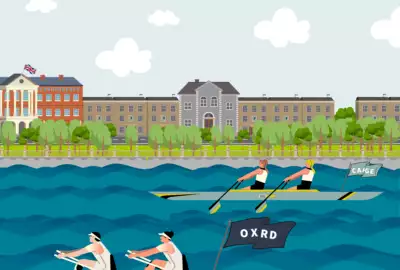Expert Insights
How to Write a Standout Oxbridge Personal Statement (2026 Edition)
Published 9th August 2024 by Alastair

Without assistance, approaching your Oxbridge personal statement and making yourself stand out can be challenging.
In addition, from 2026, UCAS is introducing a new structure to personal statement writing, moving away from the open-ended format to a three-question structure. This guide will address both formats (because they aren't that different, really) and also show you how to approach personal statements for the 2025 cycle or 2026 and beyond. Read on!
Good grades aren't enough to prove you are best suited to a particular course. While you might be a perfect A* student, hundreds of other elite students want to sit in the same seat you do. In a competitive application process, a writing a standout personal statement for Oxbridge can be the deciding factor that earns you a place there. This is your opportunity to present yourself beyond the grades and test scores, showcasing who you are, what drives you, and why you are a suitable candidate for the course you are applying to.
1) Your academic achievements provide a snapshot of your intellectual capabilities and dedication to your studies, highlighting your readiness for the challenges of university-level coursework.
2) Your attitude towards learning and overcoming challenges. A positive, resilient, proactive mindset can set you apart from other candidates.
3) Your passion for the subject, explaining why you are passionate about the field, shows that you will likely remain engaged and motivated throughout your studies.
4) Your potential to succeed in their program and beyond, including your future aspirations and how the course will help you achieve your goals.
Below we've provided some tips to help you before you get started.
Researching successful examples of Oxbridge personal statements can help you prepare for your own. While you must never plagiarise from other people, you can gain insights into how top applicants have structured their statements, highlighted their achievements, and conveyed their passion for the subject.
Websites like The Student Room provide access to real personal statements and an online forum where you can discuss your statement with other peers and gain feedback, making them useful resources for your research.

There are many excellent resources available that can guide you through the process. Here are some recommendations:
Beginning early gives you ample time to brainstorm, research, and reflect on your experiences, which can help you craft a more compelling narrative. The extra time also allows you to write several drafts, seek feedback from teachers or mentors, and make necessary revisions. This iterative process helps ensure your final statement is polished and well-structured.
Completing additional reading or work experience early is also beneficial. These activities can provide valuable content for your statement, demonstrating your enthusiasm and commitment to your chosen field. By incorporating these experiences, you can give concrete examples of your interest and aptitude, making your application stand out to admissions committees.
A problem that many students have faced is the open-endedness of a personal statement. How do you start? What should you include? What should you leave out? A good place to start is creating a template that covers all aspects of a statement that the admissions team are looking for.
We have created a template, with examples, that you could use as inspiration:
1. Start with a Compelling Introduction:
Open with a strong statement or anecdote highlighting your passion for the subject. This should grab the reader's attention and set the tone for the rest of your statement.
For example, you might begin with: “My fascination with the human mind began when I first read about Pavlov’s experiments in a psychology textbook. The idea that behaviour could be conditioned sparked my curiosity and led me to explore the complex interactions between environment and cognition further.”
2. Discuss Your Academic Achievements:
Focus on your most relevant coursework, projects, and academic experiences. Explain how these have prepared you for university-level study in your chosen subject.
For example, you could write: “During my A-level Biology course, I completed an independent research project on genetic mutations. This experience honed my analytical skills and deepened my understanding of molecular biology, reinforcing my desire to pursue a degree in Genetics.”3.
3. Highlight Relevant Extracurricular Activities:
Include activities outside the classroom demonstrating your interest in the subject, such as clubs, competitions, or volunteer work. Show how these experiences have contributed to your understanding and enthusiasm. For example, you might mention:
“As the president of my school’s Debate Club, I led discussions on ethical issues in technology, which not only improved my public speaking skills but also deepened my interest in the ethical implications of artificial intelligence.”
4. Showcase Any Work Experience or Additional Reading:
Mention any internships, work experience, or independent reading that has deepened your knowledge of the course subject. Explain how these experiences have influenced your academic and career goals.
Personal Statement Example: “My internship at a local law firm exposed me to the complexities of criminal law and inspired me to read widely on legal philosophy, shaping my decision to study Law at university.”
5. Discuss Your Motivation and Long-Term Goals:
Outline your future aspirations and explain how the course will help you achieve them. This helps to demonstrate your commitment and long-term interest in the subject.
Personal Statement Example: “I aspire to become an environmental scientist, using my research to influence policy and promote sustainable practices. Studying Environmental Science at university will equip me with the necessary knowledge and skills to achieve this goal.”
6. Conclude with a Strong Closing Paragraph:
Summarise your key points and reiterate why you are an ideal candidate for the course. Leave the admissions committee with a clear sense of your passion, readiness, and potential for success.
Personal Statement Example: “My academic achievements, extracurricular involvement, and work experience have prepared me well for the challenges of studying Medicine. I am eager to contribute to the university community and pursue a career dedicated to improving public health.”
UCAS has stated that personal statements are being restructured in 2025 to help students consolidate their essays. Here, we will break down each question and show you what you could include in each section, ensuring you cover everything the admissions team would like to know from you.
1. Why do you want to study this course or subject?
First, explain what drew you to the subject. Was it a particular
experience, a book, or a class that sparked your curiosity? Then,
discuss the aspects of the subject that fascinate you the most. Mention
any topics, theories, or ideas you find compelling and why. Finally,
clearly outline how this course will help you achieve your long-term
ambitions, whether academic, professional, or personal.
Personal Statement Example: "My passion for psychology was ignited during a summer course on cognitive behavioural therapy, where I was fascinated by the interplay between thought patterns and behaviour.
This experience solidified my desire to pursue a career in clinical
psychology, where I can apply these principles to help others..."
2. How have your qualifications and studies helped you to prepare for this course or subject?
The first section of this question could highlight the key subjects
or topics you’ve studied that directly relate to the course. Explain
what you’ve learned and how these experiences have prepared you. Then,
Mention transferable skills: Discuss broader skills you've developed,
such as critical thinking, research, or teamwork, and how these will be
beneficial in your chosen course. Finally, you should provide evidence
of preparation. Use specific examples from your studies to demonstrate
how they have equipped you for the challenges of the course.
Personal Statement Example: "Through my A-Level Biology coursework, I developed a deep understanding of cellular processes, which I know will be essential in pursuing a degree in Biochemistry. Additionally, my experience conducting independent research projects has strengthened my analytical skills, preparing me for the rigorous lab work at university..."
3. What else have you done to prepare outside of education, and why are these experiences helpful?
The first section of your final question could start with you discussing any relevant work experience, volunteer roles, or extracurricular activities related to your chosen subject. Explain how these experiences have reinforced your interests and skills. Then, move on to showcase how you demonstrate your commitment to these activities. Highlight how these activities have prepared you academically and helped you develop as a person, contributing to your overall suitability for the course. Conclude by illustrating how these experiences have shaped your understanding of the subject and your desire to pursue it further.
Oxbridge Personal Statement Example: "Volunteering at a local mental health clinic
allowed me to witness the real-world applications of psychological
theories, deepening my commitment to studying psychology. This hands-on
experience taught me valuable interpersonal skills and confirmed my
desire to make a difference in mental health..."

The work is not over yet. As with anything you've ever done for school, you'll want to proofread it, get someone else to proofread it, and adjust it until you think it's the best work you've ever written.
Proofread Everything Thoroughly
We're living in the digital age. You should have access to spell-check and AI software to assist* with sentence and paragraph structure to avoid typos, grammatical errors, and structural issues. *Please do not use a robot to write your personal statement. The admissions team can pick up on AI-written content from a mile away. Instead, use it to give you variations on paragraph structure or help you with your SPaG. Aside from robots, humans have fresh eyes that can catch mistakes that the writer and an AI android might overlook.
Get Constructive Feedback
Seek feedback from teachers, friends, or family, making sure you are specific with what feedback you want. Sometimes, when people give feedback, it might be, "Yeah, it's good" or "I don't know, it could be better." That's not very helpful. Ask for feedback focused on specific sections, content, or clarity so that people can be specific with their feedback and know what to look for.
Remember: Starting early is critical—ideally at the end of Year 12—allowing ample time for multiple drafts, additional reading, and relevant work experience that can enrich your statement. Seeking expert advice through books, courses, and premium Oxbridge programmes can provide invaluable insights into effective writing techniques and common pitfalls to avoid. Throughout the process, showcase your intellectual curiosity and passion for the subject and use specific examples of academic achievements and extracurricular experiences to demonstrate your suitability for the course.
Remember to include interview hooks that can guide your admissions interview toward your strengths. Authenticity is crucial—stay true to your personal experiences and insights, avoid the temptation to overcomplicate your language, and don't use ChatGPT to write your personal statement for you.
As you reach the final stages, ask for constructive feedback from teachers, friends, and family to refine your statement further. Proofreading thoroughly is essential to ensure your statement is polished and error-free. Remember, your goal is to create a compelling narrative that captures the attention of the admissions team and sets you apart from other applicants.
At Ivy Education, we understand the complexities of preparing for Oxbridge admissions, including the personal statement, and are here to support you every step of the way. Whether you need help with writing, editing, or preparing for admissions tests, our expert tutors are ready to help you succeed. Approach your Oxbridge application confidently, knowing you have the tools and guidance to create a shining personal statement.
Best of luck!
For personal statement building, mock interviews, Oxbridge tuition, and university advice, contact us today!
Talk to an Oxbridge Admissions Specialist Today 8.0 TopThe purpose of an Oxbridge personal statement is to introduce yourself to the admissions team, showcasing your academic achievements, passion for the subject, and potential for success in the program.
You should start writing your personal statement towards the end of Year 12 to allow ample time for drafting, revising, and seeking feedback.
To make your personal statement stand out, provide specific examples of your academic achievements, demonstrate your passion for the subject, and highlight unique experiences or perspectives.
Key elements include your academic achievements, relevant experiences, your passion for the subject, and your future aspirations.
Demonstrate intellectual curiosity by discussing additional reading, research projects, or academic challenges you've undertaken and what you learned from them.
Common mistakes include using clichés, exaggerating accomplishments, being too generic, writing your entire statement with AI tools, and failing to proofread for grammatical errors.
Balance originality with authenticity by being true to your experiences and perspectives while presenting them in a unique and engaging manner.















